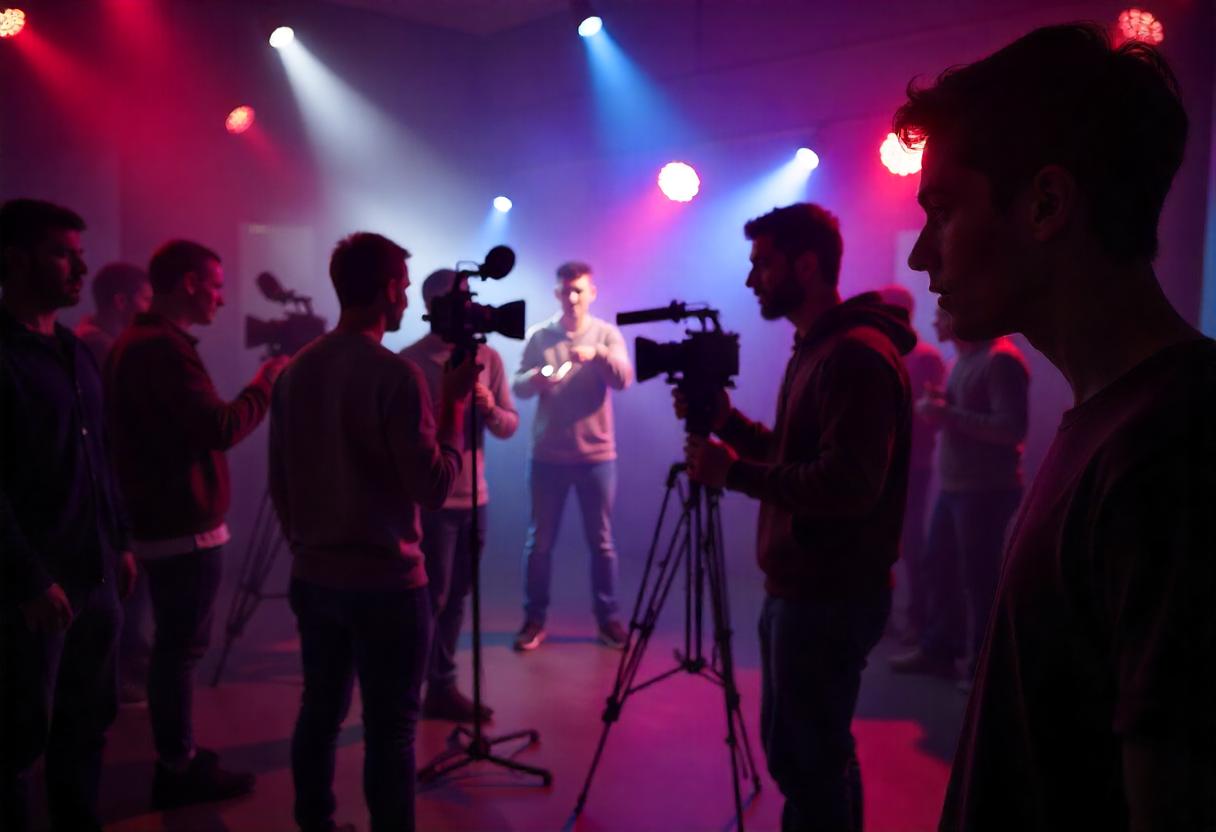What You Will Learn in a Professional Acting Course for Screen
Professional acting requires more than just facial expressions and dialogues – it’s the representation of the emotions that words cannot convey! With time, numerous legendary actors have honored this elite profession. From Devanand, Dalip Kumar, and Amitabh Bachchan to Aamir Khan, Shahrukh Khan, and Salman Khan, the list is endless.
Here’s the best part! You can be among them. All that’s required is the blend of dedication, talent, relentless willpower, and the right Acting Course. When we talk about acting courses, two names hit our mind: BSc in Cinema and MSc in Cinema.
In this blog, we will shed a spotlight on these Acting Courses, understanding the top aspects you will learn in these masterclasses and much more. Let’s flurry in!
Why a Screen Acting Course Is a Game-Changer
Professional Acting Courses are designed with the student’s ability to understand concepts and market demand in mind. Here are the key reasons behind pursuing these courses:
- Full-fledged Growth: These courses not only work on building skills but also incorporate other field knowledge, so the candidates are well-prepared to face uncertainties.
- Hands-on Experience: From the very beginning, students are exposed to real-time sets, camera handling, and live performances. This gives them the confidence and clarity for natural and impactful on-screen performances.
- Industry-relevant Curriculum: The curriculum is designed based on consultation between industry experts and working professionals. So, what you learn is exactly what the industry expects from you.
- Personality Enhancement: Acting is more than just expressions. These courses also keep a strong focus on grooming, body language, communication skills, and emotional intelligence, helping to transform into a complete performer.
- Networking Opportunities: You get the chance to connect with renowned actors, directors, and casting professionals through workshops, seminars, and industry visits. This networking becomes a valuable asset for your career.
- Showreel Development: By the course end, you will have your own showreel, your first ticket to auditions and casting calls. This helps you professionally display your talent.
- Career Support: From placement assistance to audition updates, many institutes offer lifetime support, helping you stay connected to opportunities long after your course ends.
Read Also: Acting for Screen: Film, TV & Web Series Career Guide
What You’ll Learn in a Screen Acting Course
There are numerous things you learn from a professional acting for a screen course. These programs are designed with real-world experience and creative insight in mind. Whether you are a beginner or someone who’s already done theatre, these lessons are crucial for your craft refining and becoming camera-ready. Let’s explore some of the top things you will learn during the Acting Course:
1. On-Screen Acting: Always Chase a High-Stake Goal
This is the core of performance. It’s not just your character chasing a goal; you are chasing it through your character. Every of your line, movement, and glance should come from a sense of urgency and intention. Actors are taught how to identify the wanting of character in a scene, what’s at stake, and what they are willing to risk. This is known as pursuing an objective. When you attach high stakes to your performance, the energy becomes real. The audience can feel it.
2. Really Listen to Your Scene Partner
This one is a game-changer. So often, actors wait to deliver their next line without truly listening to the other person. But acting isn’t just saying lines; it’s about reacting truthfully. In a professional Acting Course, you are taught to live in the moment and allow your scene partner’s words and energy to affect you. Only then will your response be genuine. This is where real chemistry is born, and it shows on screen.
3. The Power of Stillness
Read Also: Top 8 Professional Degrees to Pursue After 12th in 2025
Unlike theatre, where larger-than-life movements are often required, on-screen acting is all about subtlety. Sometimes, less is more. Stillness can speak louder than words when used correctly. You will learn how to control your physical movements and let your face, especially your eyes, do the talking. You will be trained to own your space and allow emotions to breathe without forcing them.
4. Emotional Recall and Memory Work
To portray real emotions, you need to access real experiences. That’s where emotional recall comes in. You will learn how to safely tap into past feelings or memories and bring them forward in a controlled way during a performance. This doesn’t mean you are faking it; it means you are being authentic and using your own truth to give life to the character.
5. Voice Modulation and Diction
Your voice is one of your strongest tools. Acting courses help you work on your pitch, tone, pace, and clarity. You will practice various breathing techniques to support strong vocal delivery. Clear diction and natural modulation are vital on screen, especially for emotional scenes or dialogues delivered in a whisper. The camera catches everything, so your voice needs to carry emotion even in the softest moments.
6. Script Analysis and Character Breakdown
Before stepping into a role, you need to understand the inside-out of the entire character. Acting Courses teach you script analysis, beats finding as well as motivation identification, subtext decoding, and relationship understanding. This helps you make informed choices that reflect your performance. You are trained to break down the journey of your character and deliver a layered performance.
7. Improvisation Techniques
You won’t always have a script in life, and sometimes even on set! That’s where improv comes in! Professional training equips you with independent thinking, unexpected cues responding, and staying in character no matter what happens. Improvisation is also a key way to pre-screen self unlocking and loosening-up.
8. On-set Etiquette and Professionalism
Knowing how to act on set is just as important as camera acting. You will learn about punctuality, crew respecting, understanding the on-set roles, following instructions, and energy management. This is key to a solid reputation building in the industry. A talented actor is valuable, but a professional one gets called back.
Read Also: Behind the Scenes: Exploring the 24 Crafts of Filmmaking
9. Audition Techniques
Your first impression is everything, and it usually starts with an audition. Courses prepare you for both online and offline auditions. From slate introduction to cold reads, you will practice it all. You will also be guided on how to prepare a monologue, understand casting briefs, and present yourself confidently in front of casting directors.
10. Creating Your Own Showreel
By the course end, you will perform a showreel shoot, a short video showcasing your acting skills. It becomes your calling card. Institutes provide the script, direction, and post-production help, ensuring you have something professional to share with agents or casting directors.
11. Handling Rejections and Building Confidence
Rejection is part of the journey. A good Acting Course doesn’t just help you in performance preparation but also builds your mental strength. You will be encouraged to accept feedback, learn from mistakes, and bounce back strongly. Confidence is not a faking self-display; it’s built with training, time, and mentors’ support.
12. Exploring Various Genres and Styles
From drama to comedy, thriller to romance, Acting Courses expose you to different genres. You will perform scenes from diverse storylines, learning how to adapt your technique accordingly. You will also explore various acting styles, like Method vs Meisner acting technique and classical approaches, and find what suits you best.
14. Collaboration and Teamwork
Read Also: 7 Creative Careers That Are Exploding Right Now
Acting isn’t a solo act. You will constantly be working with co-actors, directors, technicians, and crew. Courses emphasize teamwork, collaboration, and creative boundaries. You will do group performances, scene studies, and ensemble projects to learn the beauty of working together.
How to Nail This Professional Course?
Due to its comprehensive curriculum, performing well in professional Acting Courses has become a lot easier, especially with the rise of digital technology. Here are the key ways you can maximize these highly demanding programs’ potential:
- Will Power: You need to be well-prepared and dedicated before beginning these courses. Remember, acting is a complex field; it demands relentless dedication and willingness to become better each day. This way, you can set yourself a tone and remain prepared for any challenges on the way.
- Consistency in Practice: Acting isn’t something you can master in one day or so. The more you rehearse, the more you evolve and the better you become. Whether it’s voice modulation, facial expressions, or body language, consistent practicing helps you be more natural and confident in front of the camera.
- Open to Feedback: Constructive criticism is your journey’s best friend. Don’t shy away from it. Instructors and peers will offer valuable insights, listen to them, absorb what works for you, and use it to your benefit, crafting you into a better version each day.
- Stay Curious and Observant: Good actors are great observers. Watch films, web series, and plays. Study different acting styles, character arcs, and performances. This not only inspires you but also broadens your understanding of screen acting through the Acting Course.
- Utilize Technology: Make the most of the available digital tools, record yourself, join online workshops, and even create short content for YouTube or Instagram, among other platforms. These not only help you in your own performance review but also enable confidence building and screen presence.
- Network Smartly: You will have the chance to connect with renowned actors, directors, and casting professionals through workshops, seminars, and industry visits. This networking becomes your invaluable career asset.
- Read Scripts Actively: Don’t just read your lines; have the story understanding, the character’s journey, motivations, and relationships. Deep script analysis is important for layered and believable performance delivery.
- Take Notes and Reflect: Always carry a notebook. Jot down feedback, tips, and personal observations. Reflecting on your learning helps in concept reinforcement and progress tracking.
Read Also: The Rise of Virtual Reality Films & Its Impact on Filmmaking
Wrapping Up!
Stepping into the professional screen acting world is more than just a decision; it’s a commitment. A commitment to growth, creativity, and constant self evolution.
These Acting Courses are designed to teach you to act and enable you to transform into a full-fledged professional who understands the nuances of the screen well, the emotions behind the words, and the discipline behind the spotlight.
Always remember, every legendary actor was once a student, curious, hopeful, and full of dreams. Now it’s your turn!
Get ready to turn your passion through AAFT professional courses. With expert training and ample practical exposure, we would help you turn your Acting fascinations into unforgettable success stories!











